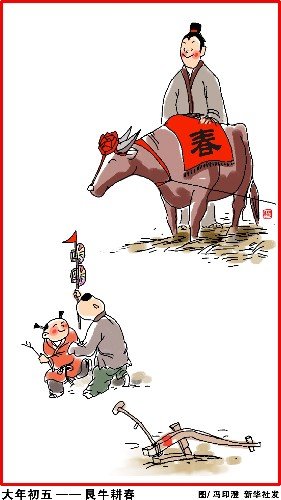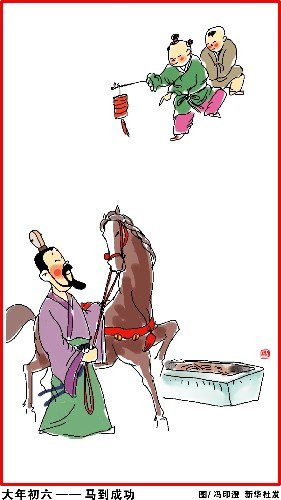初一到十五 春节习俗知多少
中国日报网 2018-02-16 10:00


大年初四:三羊开泰
The old saying "three rams bring bliss" is connected with the fourth day, which says that by making a good beginning a happy end comes.
初四则和俗语“三羊开泰”有关,意思是岁首吉利就预示着岁末幸福。
According to folklore, it is also the day to welcome back the Kitchen God. On this day, the Kitchen God would check the household and therefore people should not leave home.
民间还传说这一日是迎回灶神的日子。这一天灶神会清点每家的人数,所以切忌外出离家。

大年初五:艮牛耕春
The fifth day is also called the "day of cow". According to Chinese folklore, the first seven days of the 1st lunar month are respectively called "day of chicken", "day of dog", "day of pig", "day of sheep", "day of cow", "day of horse" and "day of man". When creating all living beings on earth, Nu Wa, a goddess in Chinese mythology, created the six creatures before human beings.
初五也被称为“牛日”。民间传说正月头七天分别是“鸡日”、“犬日”、“猪日”、“羊日”、“牛日”、“马日”和“人日”。中国传统神话中的女神女娲在创造凡间生物时就是遵循了这个顺序,在创造人类之前先创造了这六种生物。
The fifth day is also the God of Fortune's birthday and people will celebrate this day with a large banquet. This day is also commonly known as the Festival of Po Wu, literally breaking five. According to custom, it is believed that many New Year taboos can be broken on this day.
初五还是财神的生日,人们会举办盛宴以示庆祝。这天也被称为“破五日”,字面意思是打破数字五。根据习俗,许多新年禁忌过此日皆可破。

大年初六:马到成功
On the sixth day, people make wishes for "ma dao cheng gong", win success immediately upon arrival.
初六,人们祈祷“马到成功”,意思是成功马上就会到来。
According to tradition, families usually send away the Ghost of Poverty on this day. To send away him, Chinese people will usually throw away their ragged clothes, rubbish and other dirty things.
各家各户在初六有送“穷鬼”的传统。人们会扔掉破烂的衣服、垃圾和其他脏东西,预示送走穷鬼。
By doing this Chinese people wish to send away poverty and welcome the beautiful days and good luck in the New Year.
这个习俗寓意赶走贫穷,新的一年迎来好日子和好运气。























 英语点津微信
英语点津微信 双语小程序
双语小程序












